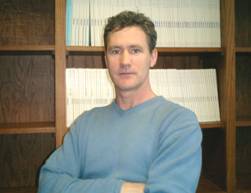|
|
 |
Dr. Kappes received a B.A. in biology from Thomas More College, KY and earned his Ph.D. in the Department of Microbiology and Experimental Medicine at Saint Thomas Institute, Cincinnati, OH. As a postdoctoral fellow, he studied HIV-1 pathogenesis with Drs. George Shaw and Beatrice Hahn at UAB. He joined the Department of Medicine in 1989. Dr. Kappes has a secondary faculty appointment in the Department of Microbiology and is a Career Research Scientist in the Department of Veterans Affairs.
Dr. Kappes’ research focuses on understanding the early steps of the HIV-1 life cycle, including virus entry, disassembly/uncoating, and formation of the enzymatically active reverse transcriptase (RT) heterodimer (p51/p66). Studies on HIV-1 entry examine how specific virus-host cell interactions facilitate infection through receptor-mediated and alternative entry pathways. Studies on disassembly/uncoating investigate how the HIV-1 core changes upon entry into the cell cytoplasm and how specific viral and cellular factors affect this change, resulting in the formation of an infectious initiation complex. Studies on the RT heterodimer examine subunit-specific molecular determinants that mediate RT dimerization, p51/p66 subunit interaction and enzyme activity. Together, these studies seek to elucidate the molecular mechanisms by which HIV-1 transitions from an extracellular particle to an intracellular nucleoprotein/preintegration complex capable of infecting the host. An important component of his research program exploits retroviral and lentiviral vectors to elucidate mechanisms by which HIV-1 interacts with mucosal cells. These studies address pathways of virus entry into the mucosal epithelial cells, factors that regulate virus expression in intestinal macrophages, and the role of mucosal dendritic cells and DC-SIGN in virus persistence and escape from neutralizing antibody.
Selected Publications
- Wu, X., Liu, H., Xiao, H., Conway, J.A., Hunter, E. and Kappes, J.C. Functional RT and IN incorporated into HIV-1 particles independently of the Gag/Pol precursor protein. EMBO J. 16:5113-5122, 1997.
- Wu, X., Liu, H., Xiao, H., Conway, J.A., Hehl, E., Kalpana, G.V., Prasad, V. and Kappes, J.C. Human immunodeficiency virus type 1 integrase protein promotes reverse transcription through specific interactions with the nucleoprotein reverse transcription complex. J. Virol. 73:2126-2135, 1999.
- Wu, X., Wakefield, J.K., Liu, H., Xiao, H., Kralovics, R., Prchal, J.T., and Kappes, J.C. Development of a novel trans-lentiviral vector that affords predictable safety. Molec. Ther. 2:47-55, 2000.
- Wei, X., Decker, J.M., Liu, H., Zhang, Z., Arani, R.B., Kilby, J.M., Saag, M.S., Wu, X., Shaw, G.M. and Kappes, J.C. Emergence of resistant HIV-1 in patients receiving fusion inhibitor (T-20) monotherapy.Antimicrob. Agents Chemother. 46:1896-1905, 2002.
- Noya F, Chien WM, Wu X, Banerjee NS, Kappes JC, Broker TR and Chow LT. The promoter of the human proliferating cell nuclear antigen gene is not sufficient for cell cycle-dependent regulation in organotypic of heratinocytes. J. Bio. Chem. 277:17271-17280, 2002.
- Wei, X., Decker, J.M., Wang, S., Hui, H., Kappes, J.C., Wu, X., Salazar-Gonzalez, J.F., Salazar, M.G., Kilby, J.M., Saag, M.S., Komarova, N.L., Nowak, M.A., Hahn, B.H., Kwong, P.K., and Shaw, G.M. Antibody neutralization and escape by HIV-1. Nature 422:307-312, 2003.
- Mulky A, Sarafianos SG, Arnold E, Wu X and Kappes JC. Subunit-specific analysis of the human immunodeficiency virus Type-1 reverse transcriptase (p51/p66) in vivo. J. Virol. 78:7089-7096, 2004.
- Daniel R, Greger JG, Katz RA, Taganov KD, Wu X, Kappes JC, and Skalka AM. Evidence that stable retroviral transduction and cell survival following DNA integration depends on components of the nonhomologous end joining repair pathway. J. Virol. 78:8573-8581, 2004.
- Van Tine BA, Kappes JC, Banerjee NS, Knops J, Lai L, Steenbergen RDM, Meijer CLJM, Snijders PJF, Chatis P, Broker TR, Moen PT and Chow LT. Clone selection for transcriptionally active viral oncogenes during progression to cancer. J. Virol. 78:11172-11186, 2004.
- Mulky A, Sarafianos S, Jia Y, Arnold E, and Kappes JC. Identification of Amino Acid Residues in the Human Immunodeficiency Virus Type-1 Reverse Transcriptase Tryptophan-Repeat Motif that are Required for Subunit Interaction in vivo. J. Molec. Bio. 349:673-684, 2005.





